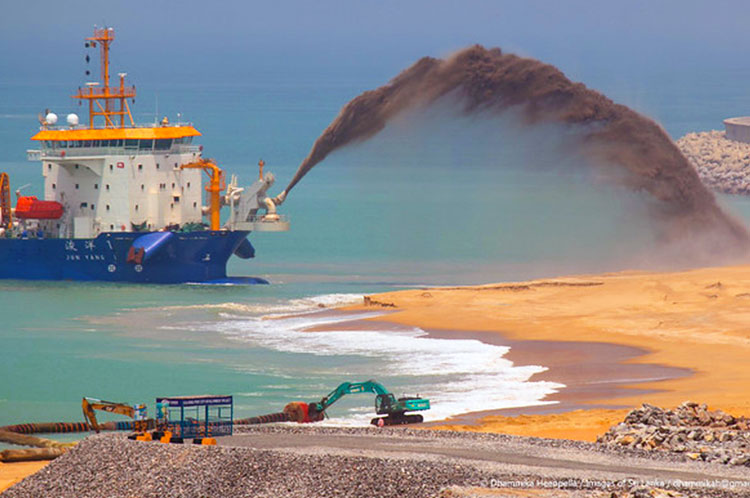June 3, 2019 Reading Time: 4 minutes
 Reading Time: 4 min read
Reading Time: 4 min readImage Credits: Dhammika Heenpella/ Flickr
Paikiasothy Saravanamuttu*
The topic of the Belt and Road Initiative (BRI) and China’s growing presence in the Indian Ocean region has aroused much discussion. Some general points are in order. The first is that the Initiative and presence are here to stay. In other words, China is going to be a permanent factor in Indian Ocean politics,1 and its role is only going to further expand. The second point is that, despite past political tensions, it is unlikely that the region’s relationship with China would lead to open conflict. There will be varying degrees of competition, which might at times even verge on conflict, however, given that China is the largest trading partner for most Indian Ocean countries,2 it is going to take a lot to disrupt these trading relationships.
Therefore, the pertinent issue that arises is whether or not this region should move towards arriving at certain rules of engagement between the various actors concerned. Should there not be a controlling management and a set of guidelines, or should there be a set of guidelines that manage relationships, and provide an appropriate dispute resolution process to handle violations of these guidelines? Indeed, perhaps the primary objective of Sri Lankan foreign policy should be to try to arrive at a rule-based international agreement on engagement.
With regard to the Chinese impact on the region as a whole, China has always maintained that it does not interfere in the internal affairs of a country.3 At the level of diplomatic discourse, this is unproblematic, because that’s how the international system is supposed to function. However, it would be disingenuous to imagine that one could engage with China to the extent that many regional countries now do, without any domestic repercussions. Inter-state relations do have a domestic impact, and the emerging issue in Sri Lanka-China relations is the impact of Chinese involvement in Sri Lanka’s infrastructure development.4 However, China has arguably had as great a domestic impact in Sri Lanka through its provision of an ‘insurance policy’ for the Mahinda Rajapaksa regime against alleged human rights violations in the course of the Sri Lankan civil war.5 China used its influence amongst Afro-Asian nations to ensure that Sri Lanka was supported in the UN Human Rights Council. It succeeded in some aspects, and failed in others. But it was this insurance policy that provided the Sri Lankan government with the confidence to govern in the way that it did.
Sri Lanka’s engagement with China, therefore does, and will, have a lot of domestic political consequences. For example, if one takes the Colombo International Financial City6 – the highlight of Chinese investment in the country – a relevant question that arises is, would educated Sri Lankans be able to find satisfactory employment there? Since the project is an international financial city, it could well have separate laws and function like a separate country. If the Sri Lankan government does not align domestic policies to provide a supply of individuals who can seize the benefits of Chinese-funded infrastructure projects, there could be significant domestic unrest, which China would be associated with. Therefore, at the end of the day, the issue with regard to the BRI is the extent to which China can manage the domestic dimension of its relationship with any particular country in the region. Can it do so in a way that it insulates itself from accusations of influencing the way things are done, and can it do so in a way that is very much pure business? Given the current global and regional geopolitical dynamics, it would be quite difficult for China to do so.
Therefore, as far as Sri Lanka is concerned, it has benefited from Chinese investment considerably in terms of infrastructure, and depending on the way one looks at it, the Mahinda Rajapaksa regime was insulated from international pressure because of the diplomatic protection that China offered it. Therefore, perhaps it’s time now for Sri Lanka to give China an opportunity to prove its peaceful and commercial intentions in the Indian Ocean, by exploring the possibility of rules-based regional engagement.
1Mourdoukoutas, P. (2018). China Wants To Turn The Indian Ocean Into The China Ocean. [Online] Forbes. Available at: https://www.forbes.com/sites/panosmourdoukoutas/2018/02/12/china-wants-to-turn-the-indian-ocean-into-the-china-ocean/#37d3fea55bef [Accessed 28 May 2019].
2Wignaraja, G., Collins, A. and Kannagara, P. (2019). Is the Indian Ocean Economy A New Global Growth Pole? [online] LKI.lk. Available at: https://lki.lk/publication/is-the-indian-ocean-economy-a-new-global-growth-pole/ [Accessed 31 May 2019].[Accessed 28 May 2019].
3Ministry of Foreign Affairs of the People’s Republic of China. (2004). The Five Principles [Online] Ministry of Foreign Affairs of the People’s Republic of China. Available at: https://www.fmprc.gov.cn/mfa_eng/topics_665678/seminaronfiveprinciples_665898/t140589.shtml [Accessed 28 May 2019].
4 Abi-Habib, M. (2018). How China Got Sri Lanka to Cough Up a Port [Online] New York Times. Available at: https://www.nytimes.com/2018/06/25/world/asia/china-sri-lanka-port.html [Accessed 28 May 2019].
5Ministry of Foreign Affairs. (2013). China’s Position on Sri Lanka’s Human Rights Related Issues[Online] Ministry of Foreign Affairs of Sri Lanka. Available at: https://www.mfa.gov.lk/ta/4354-chinas-position-on-sri-lankas-human-rights-related-issues/ [Accessed 28 May 2019].
6Ministry of National Policies, Economic Affairs, Resettlement and Rehabilitation, Northern Province Development and Youth Affairs. (n.d). Colombo Port City to be transformed into an International Financial Centre. [Online] Available at: http://www.mnpea.gov.lk/web/index.php/en/news-events/150-colombo-port-city-to-be-transformed-into-an-international-financial-centre.html [Accessed 28 May 2019].
*Dr. Paikiasothy Saravanamuttu is the founder and Executive Director of the Centre for Policy Alternatives (CPA), and a member of the Foreign Policy Advisory Group. These remarks were delivered at a joint event held by LKI and Chatham House, UK, on Chinese outbound investment and the Belt and Road Initiative (BRI). The opinions expressed in this article are the author’s own and not the institutional views of LKI, nor do they necessarily reflect the position of any other institution or individual with which the author is affiliated.